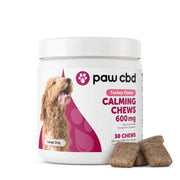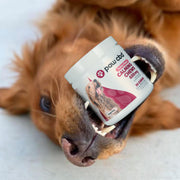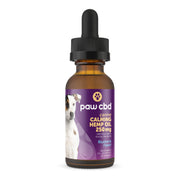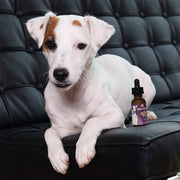Occasionally licking their paws is a pretty common dog behavior, but excessive paw licking can sometimes be a sign that something is wrong. Depending on how often and in what way your dog is licking its paws, you may be able to determine the reason for the behavior and possibly even address it at home (though if you’re concerned, consulting your veterinarian is always the best course of action). Here’s what you need to know about dog paw licking and how to stop it.
Why Does My Dog Lick Their Paws?
There are a variety of reasons that you might find your dog licking and chewing on their paws. Some conditions and circumstances that may cause this dog behavior include:
- Injury
- Environmental or food allergies
- Separation anxiety or stress
- Dry skin
- Parasites
If Your Dog Is Licking a Single Paw, It May Be an Injury
If your dog’s excessive paw licking is focused on a single paw rather than both, this might indicate an injury of some kind. An injury will inspire a dog to lick the painful area because their saliva has healing properties.
Often, these can be identified with a simple physical exam of your dog’s paws. Your dog might start licking because they have a thorn or burr stuck between their toes, or a cut on their paw pad, or a bee sting, or torn nail. The paw could also simply be irritated from walking on a hot or salted sidewalk or a rough patch of sharp gravel.
It’s also important to note that your dog’s paw licking might indicate pain or injury in another part of the body, such as the leg or shoulder. Sometimes dogs will lick their paws to try and cope with arthritis or other painful issues that can’t be easily seen.
Allergies to Food or Environment May Cause Dog Paw Licking
Allergies can be a more difficult cause to diagnose, but it’s not uncommon for an allergic reaction to cause paw licking. Sometimes, foods can cause your dog’s paws to itch, which will make them lick the area. An allergy to something in their environment that they walk on, such as grass, landscaping chemicals, or deicing products, can also cause this dog behavior.
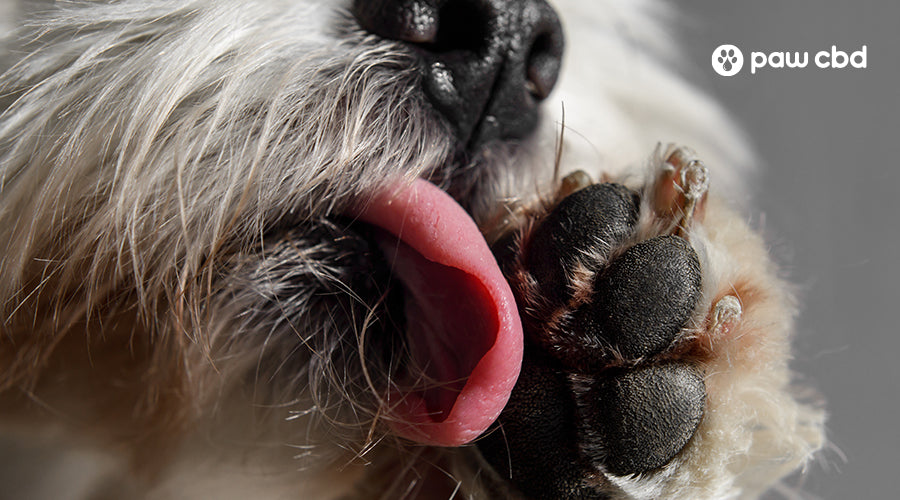
A Dog Licking Paws May Be Because of Stress of Anxiety
This common dog behavior can also be a stress signal in your canine companion. Compulsive behaviors like excessive paw licking might indicate that your dog is experiencing discomfort or stress because of a change in their routine, loud noises, or separation issues.
Similarly, your dog might be licking their paws because they are bored. Mental and physical stimulation are vital for a dog’s quality of life, and if they aren’t getting enough attention and engagement through the day, they may develop this compulsive behavior out of sheer boredom.
Dogs Sometimes Lick Their Paws Because of Skin Issues Such as Dryness
Dry paw pads can feel irritated and even crack if the skin isn’t treated with a moisturizer or balm. Especially if you live in a cold, arid climate, your dog might lick their paws because the skin on the pads is too dry. Dry or irritated paw pads can also occur if you bathe your dog too often.
Parasites Make Your Dog Itchy, Which Causes Licking
Parasites such as fleas or mange might be making your dog’s skin and fur itch, which can inspire them to lick or chew on their paws. Often, you can see some of these bugs crawling around on your dog’s skin.
This issue is easily addressed by a regular preventative flea and tick medication. Your veterinarian can also provide a topical or oral medication to deal with the parasites that might cause paw licking.
Prevention and Treatment for Excessive Paw Licking
Here are some tips for preventing and dealing with excessive paw licking:
- Consider dog booties
- Clean and dry your dog’s paws after walks
- Use a moisturizer or balm
- Maintain a complete daily routine with your pet
- Use citrus or bitter apple sprays to deter your dog’s licking
- Try an Elizabethan collar as a last resort or if the case is urgent
Cover Your Dog’s Paws to Stop Licking
One of the easiest ways to stop your dog from licking their paws is to cover their paws with dog booties or even just a small sock. Some dogs who are really irritated by booties and don’t like to walk while wearing them might not be so bothered by a baby sock around their paw.
Not only does covering the paw prevent your dog from engaging in compulsive licking, but it can also protect them while they’re outside from environmental allergies or other irritants.
Tend to Your Dog’s Paws When They Come Inside
Another way to prevent paw licking is by washing and drying off your dog’s paws when they come in from a walk. If you choose not to use dog booties, this is another way to protect your pet from environmental allergens and irritants they might encounter while outside. While it can’t prevent them from getting an injury such as a thorn or bee sting, it might help with the typical dermatitis that can result from walks and outdoor time and cause paw licking.
Use a Moisturizer or Balm to Keep Your Dog’s Paws Supple

If dryness is the reason for your dog licking its paws, then a simple moisturizer or balm might be the best solution to stop this dog behavior. Be sure your dog’s paws are clean and dry before applying any products to them, and choose a moisturizing product that is made with natural ingredients like shea butter or coconut oil.
Keep Your Dog’s Diet and Daily Routine Well-Rounded
If you think your dog’s paw licking might be because of boredom, stress, or a food allergy, you need to solve these issues by honing their daily routine. Your dog’s diet needs to be carefully examined to figure out what might cause the allergic reaction of paw licking. Consult your veterinarian about the best dog food to use for your pet if they have food allergies.
Make sure your dog is getting plenty of exercise and daily mental stimulation from you. If you aren’t able to provide this yourself, you might need to consider a dog walker or dog sitter who can come attend to your pet during the day to address their separation issues that could cause paw chewing. Likewise, make sure your pet can escape a stressful situation by providing a dog safe space and ensuring their environment is free from typical stress triggers like loud noises.
Make Your Dog’s Paws Taste Bad with Citrus or Bitter Apple
If you’re really struggling to stop your dog’s paw licking, you might try coating their paws in something that tastes bitter and unappealing. Citrus juices are often offensive in both scent and flavor for canines, so placing a little bit on your dog’s paws may discourage them from excessive paw licking. Likewise, bitter apple spray can also be used to deter a pet from licking.
You should only do this if you’re confident that your dog’s paw licking is not because of an injury or infection, as citrus may be very painful if it’s put onto a cut or irritated skin.
Elizabethan Collars Can Be Used as a Temporary Solution
If you need to reduce the licking immediately in order to protect your dog from further infection, your veterinarian might recommend the use of an Elizabethan collar, also known as an e-collar. These cones can make your dog’s paws inaccessible, so they have to stop licking immediately. This can be a really important tool if your dog’s paw licking has started to cause other health issues and needs to be addressed urgently.
The Risk of a Dog Licking Paws: Secondary Infection
It’s very important to address your dog’s excessive paw licking. Once you notice this dog behavior graduating from occasional to more consistent or obsessive, you need to figure out the cause and find a way to make your dog stop paw licking.
Constant licking can keep the paw moist and cause an infection such as yeast or bacteria to grow in the fur and skin on your dog’s paws. This can cause redness, swelling, more itching, and discomfort, which will cause your dog to lick their paws more – a dangerous cycle that leaves your pet uncomfortable and unhealthy. Don’t wait to address your dog licking paws!

